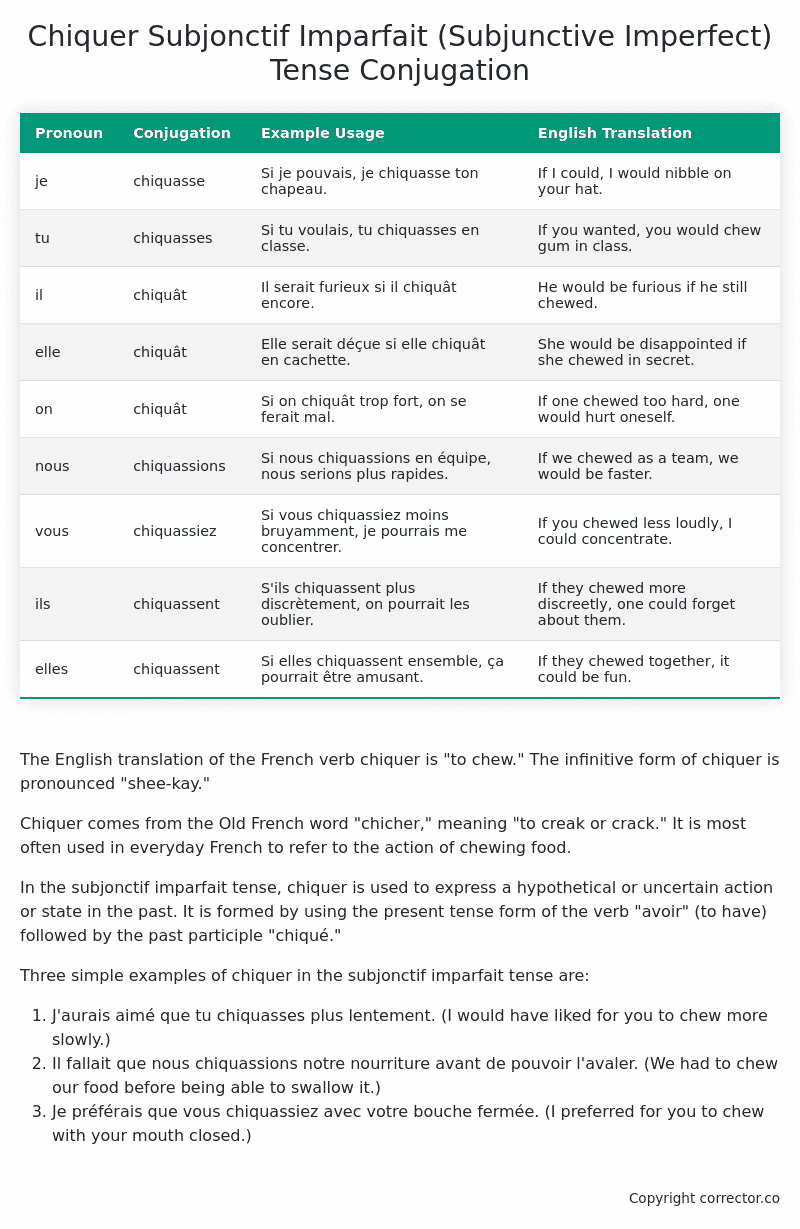Subjonctif Imparfait (Subjunctive Imperfect) Tense Conjugation of the French Verb chiquer
Introduction to the verb chiquer
The English translation of the French verb chiquer is “to chew.” The infinitive form of chiquer is pronounced “shee-kay.”
Chiquer comes from the Old French word “chicher,” meaning “to creak or crack.” It is most often used in everyday French to refer to the action of chewing food.
In the subjonctif imparfait tense, chiquer is used to express a hypothetical or uncertain action or state in the past. It is formed by using the present tense form of the verb “avoir” (to have) followed by the past participle “chiqué.”
Three simple examples of chiquer in the subjonctif imparfait tense are:
- J’aurais aimé que tu chiquasses plus lentement. (I would have liked for you to chew more slowly.)
- Il fallait que nous chiquassions notre nourriture avant de pouvoir l’avaler. (We had to chew our food before being able to swallow it.)
- Je préférais que vous chiquassiez avec votre bouche fermée. (I preferred for you to chew with your mouth closed.)
Table of the Subjonctif Imparfait (Subjunctive Imperfect) Tense Conjugation of chiquer
| Pronoun | Conjugation | Example Usage | English Translation |
|---|---|---|---|
| je | chiquasse | Si je pouvais, je chiquasse ton chapeau. | If I could, I would nibble on your hat. |
| tu | chiquasses | Si tu voulais, tu chiquasses en classe. | If you wanted, you would chew gum in class. |
| il | chiquât | Il serait furieux si il chiquât encore. | He would be furious if he still chewed. |
| elle | chiquât | Elle serait déçue si elle chiquât en cachette. | She would be disappointed if she chewed in secret. |
| on | chiquât | Si on chiquât trop fort, on se ferait mal. | If one chewed too hard, one would hurt oneself. |
| nous | chiquassions | Si nous chiquassions en équipe, nous serions plus rapides. | If we chewed as a team, we would be faster. |
| vous | chiquassiez | Si vous chiquassiez moins bruyamment, je pourrais me concentrer. | If you chewed less loudly, I could concentrate. |
| ils | chiquassent | S’ils chiquassent plus discrètement, on pourrait les oublier. | If they chewed more discreetly, one could forget about them. |
| elles | chiquassent | Si elles chiquassent ensemble, ça pourrait être amusant. | If they chewed together, it could be fun. |
Other Conjugations for Chiquer.
Le Present (Present Tense) Conjugation of the French Verb chiquer
Imparfait (Imperfect) Tense Conjugation of the French Verb chiquer
Passé Simple (Simple Past) Tense Conjugation of the French Verb chiquer
Passé Composé (Present Perfect) Tense Conjugation of the French Verb chiquer
Futur Simple (Simple Future) Tense Conjugation of the French Verb chiquer
Futur Proche (Near Future) Tense Conjugation of the French Verb chiquer
Plus-que-parfait (Pluperfect) Tense Conjugation of the French Verb chiquer
Passé Antérieur (Past Anterior) Tense Conjugation of the French Verb chiquer
Futur Antérieur (Future Anterior) Tense Conjugation of the French Verb chiquer
Subjonctif Présent (Subjunctive Present) Tense Conjugation of the French Verb chiquer
Subjonctif Passé (Subjunctive Past) Tense Conjugation of the French Verb chiquer
Subjonctif Imparfait (Subjunctive Imperfect) Tense Conjugation of the French Verb chiquer (this article)
Subjonctif Plus-que-parfait (Subjunctive Pluperfect) Tense Conjugation of the French Verb chiquer
Conditionnel Présent (Conditional Present) Tense Conjugation of the French Verb chiquer
Conditionnel Passé (Conditional Past) Tense Conjugation of the French Verb chiquer
L’impératif Présent (Imperative Present) Tense Conjugation of the French Verb chiquer
L’infinitif Présent (Infinitive Present) Tense Conjugation of the French Verb chiquer
Struggling with French verbs or the language in general? Why not use our free French Grammar Checker – no registration required!
Get a FREE Download Study Sheet of this Conjugation 🔥
Simply right click the image below, click “save image” and get your free reference for the chiquer Subjonctif Imparfait tense conjugation!

Chiquer – About the French Subjonctif Imparfait (Subjunctive Imperfect) Tense
Formation
Common Everyday Usage Patterns
Interactions with Other Tenses
Subjonctif Présent
Indicatif Passé Composé
Conditional
Conditional Perfect
Summary
I hope you enjoyed this article on the verb chiquer. Still in a learning mood? Check out another TOTALLY random French verb conjugation!


